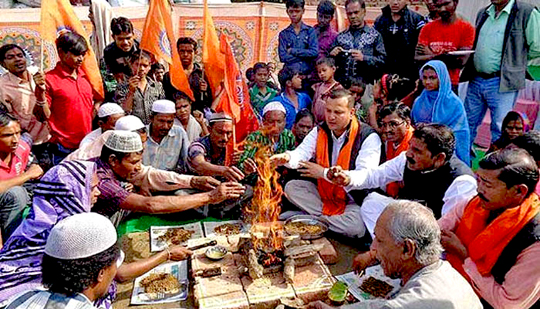Surat, Jan 9: Vishva Hindu Parishad (VHP) leader Pravin Togadia on Friday claimed that his organisation had re-converted more than five lakh Christians and 2.5 lakh Muslims to Hinduism in the last ten years.
Speaking at a function here today, Togadia also called for a mass drive to continue this "Ghar Wapsi" to save the Hinduism in India.
"Within last ten years, we did Ghar Wapsi of more than five lakh Christians and 2.5 lakh Muslims. Our rate of Ghar Wapsi used to be around 15,000 each year. But last year, we have crossed the mark of 40,000, which is excluding the figures of RSS," said Togadia, the international working president of VHP.
"If Hindus need to be in majority in India and to save our religion, we have to engage in many more Ghar Wapsi drives to bring crores of others into our religion," said Togadia, who was here to take part in VHP's fund raising event.
During his brief interaction with media afterwards, the right-wing leader also demanded that all the Hindus of Pakistan should be given Indian citizenship. He also reiterated that Ram temple will definitely be constructed in Ayodhya.
"Ram temple will be built in Ayodhya, and there is no doubt about it. To build it, the Parliament must bring a law," he said.
Also Read: Yogi’s Hindu Yuva Vahini accused of abducting, raping teenage Muslim girls







Comments
Burnol time for some people here.. Welcome to the Original Religion.
mr thogadia several poor adivasi hundus are embrasing islam and christaianity becuase of your caste system in hinduism. try to help these poor hindus.
Oh yeah!!! IN YOUR DREAMS....right.Happy dreaming Togadia!!!
oh, thogadya got wrong information may be 7.5 lakhs were converted to islam
Togadiya you doesnt know that more than 50 lkh non muslims embraced islam in last 8 years.
Whatever tricks they do to reduce Muslims, But, Allah made Islam to supersede all the religions of the earth. Allah is the best planner.
Mr.Togadiya is just following his master's foot step!! nothing new in his statement, Just look @ our honorable prime minister's statement before election and now?? look at our prime ministers statement when he was on foreign tours and when he is in our country!! only these people are fooling us!! don't give much attention for these types of ill mentality what they called leaders!!
Pravin Togadia being JAIN, why he did not convert to Hinduism before converting others to Hinduism?
Is he loosing his mental stability??
Not only Pakistani Hindus, but, they should bring back to India Srilankan Hindus, Bangladeshi Hindus, Nepali Hindus, Mauritius Hindus, Thailand Hindus, American Hindus, European Hindus, African Hindus, Middle Eastern Hindus etc., All the Hindus must come back to Hindustan. So, they will have majority.
its not new thing..........he is not true to himself..as he himself does not belong to HINDUISM. he is a Jain
Common innocent Hindus are fooled time by time.........even in Al jazeera interview Ram madhav told they do follow Hindu culture not Religion
Very very absurd news. Even if it happened, they don't know what is Hinduism and what is Islam, what is Christianity.
Go to Bombay's Maidan where dozens of educated Hindus are accepting Islam in public, without any pressure or greed.
The govt's seems itself shows Hinduism is diminishing and Muslim population is increasing.
Do whatever you want, the God' s real religion will rein for ever,
All man made fake religions will cease.
I THINK THOGADIYA HAD DREAM LAST NIGHT ABOUT THIS ,
PLEASE DONT JOKE TOO MUCH .....
RSS means liars and always lying. foolish people
Fun of the year... will reward him with \FEKU of THE YEAR\"... Jai ho..."
Muslims Worshiping ONE & ONLY GOD ALLAH, The True CREATOR.
ALLAH is the creator of all that exists, Even U Togadia.
Ye Togadia, stop spreading False news, People are not FOOLS to believe what U say.... U are old. Soon people will throw YOU and Your devils will also Forsake U.
Look for the TRUE GOD and ask his Forgiveness...
ALLAH will forgive all Sins if repented sincerely except SHIRK (associating partners with him)
STOP worshiping the CREATION and LOOK for the CREATOR. IF U R HOnest The CREATOR will guide U to know the reality of YOUR Idol Worship...
Muslims will never bow down to idols & shits & urine & monkeys- SiCK people will do such thing...
RESEARCH it if U are intelligent.
I think thogadia is totaly mental, in last 10 years more then 10 lakh Non muslims converted to Islam.
FAKE NEWS AGAIN & ONLY FOOLISH WILL BELIEVE....
togadia pagal, It's totally a fake news.
Add new comment